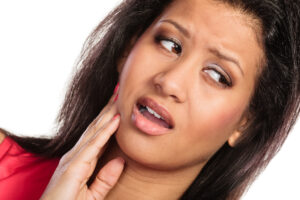 When the TMJ (temporal mandibular joint) is not tracking properly, a person is said to have TMJD (the D is for dysfunction), although many people commonly say, “I have TMJ”. Well, we all do. Muscle imbalances within the jaw, cranium (head) and neck can cause the TMJ not to open and/or close properly. This can result in a jaw that hurts, pops, clicks, can’t open all the way, can’t close properly, deviates or zigzags when opening or closing, or tires when chewing. TMJD affects a lot of people and is the cause of their headaches, neck aches, irritability, fatigue, and even constantly biting their jaw or lip. The muscle imbalances causing the problems are commonly due to past injuries to the head, neck or jaw itself. The TMJ has an intricate influence on the rest of the body due to the neurological connection with which it functions. Therefore, just about anything can affect the TMJ and vice-versa. This is why someone may only have a jaw problem when they are sick – or their TMJ problems may have first started when they became sick. It is not uncommon for a TMJ issue to start once a woman has a hysterectomy or after she goes through menopause.
When the TMJ (temporal mandibular joint) is not tracking properly, a person is said to have TMJD (the D is for dysfunction), although many people commonly say, “I have TMJ”. Well, we all do. Muscle imbalances within the jaw, cranium (head) and neck can cause the TMJ not to open and/or close properly. This can result in a jaw that hurts, pops, clicks, can’t open all the way, can’t close properly, deviates or zigzags when opening or closing, or tires when chewing. TMJD affects a lot of people and is the cause of their headaches, neck aches, irritability, fatigue, and even constantly biting their jaw or lip. The muscle imbalances causing the problems are commonly due to past injuries to the head, neck or jaw itself. The TMJ has an intricate influence on the rest of the body due to the neurological connection with which it functions. Therefore, just about anything can affect the TMJ and vice-versa. This is why someone may only have a jaw problem when they are sick – or their TMJ problems may have first started when they became sick. It is not uncommon for a TMJ issue to start once a woman has a hysterectomy or after she goes through menopause.
A jaw fatiguing from a typical meal or even chewing gum is similar to when any other muscle fatigues. Sometimes it is a direct muscle problem within the jaw, other times it is from a lack of certain nutrients, most commonly pantothenic acid (vitamin B5).
The immune system has a strong relationship to the jaw (hence the immune example above), but also so does blood sugar. I wrote a paper (under Research Papers) linking TMJ problems to blood sugar handling problems (dysglycemia) and tinnitus (ringing in the ears).
Often the TMJ is the symptom and not the cause. Another great example is grinding of the teeth at night (bruxism). This is a stress problem that the person is not dealing with – it is not a TMJ problem. And a night guard may keep you from destroying your teeth, but it won’t fix the problem.




I found your article on planter fasciitis very interesting and completely contrary to what every foot doc I’ve visited. I have had this problem for almost 2 years now and tried everything including injections, shockwave treatment, lasers, boots, orthotics and on and on. I had an MRI which showed a lot of inflammation in my heel and a slight tear. I’m beginning to think this might be something other than PF. I used to have the problem of the awful pain when you first get up in the morning but now the symptoms have completely changed. I’m fine in the morning but as a walk during the day, the pain gets to be unbearable and when I get in bed at night, I often get sharp stabbing pain. I do wear very cushioned heel shoes because it is the only thing that enables me to walk. I’m in FL for the winter so too far from you to make an office visit. Any ideas? Yes I try the ice at night but anti- inflamitories seem to have no affect even the prescription ones and steroids. I’d gladly pay for an on-line consult because I don’t know what else to try. Let me know if you have any ideas.
Plenty of info on PF over at the Sock-Doc site!
How much B5 for a 100 lb 13 year old boy who’s having TMJD?
Sorry, can’t give personal advice like that.